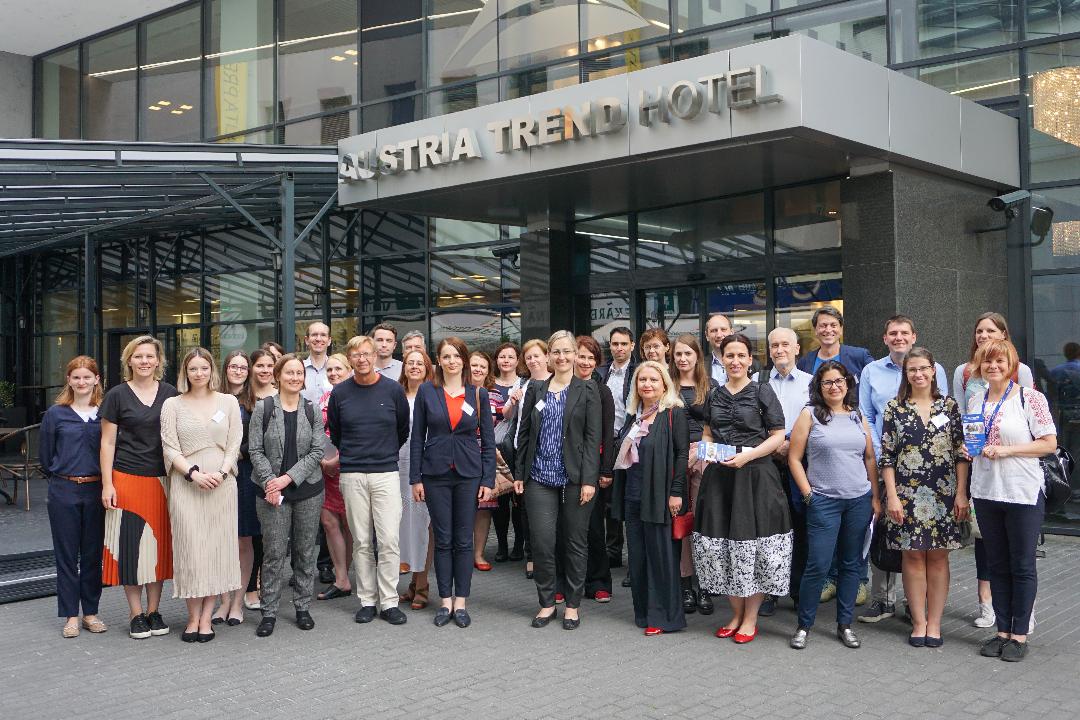INDEED - JUNE 04-05, 2019 │Slovakia│INDEED General Assembly 2 in Bratislava
04-08-2019
This summer started with important events for the INDEED project. We are at the beginning of August and we want to share with all those who follow our project the results of the first year of the project that were presented in the General Assembly 2 on June 4-5, 2019 in Bratislava.
Welcome and project overview
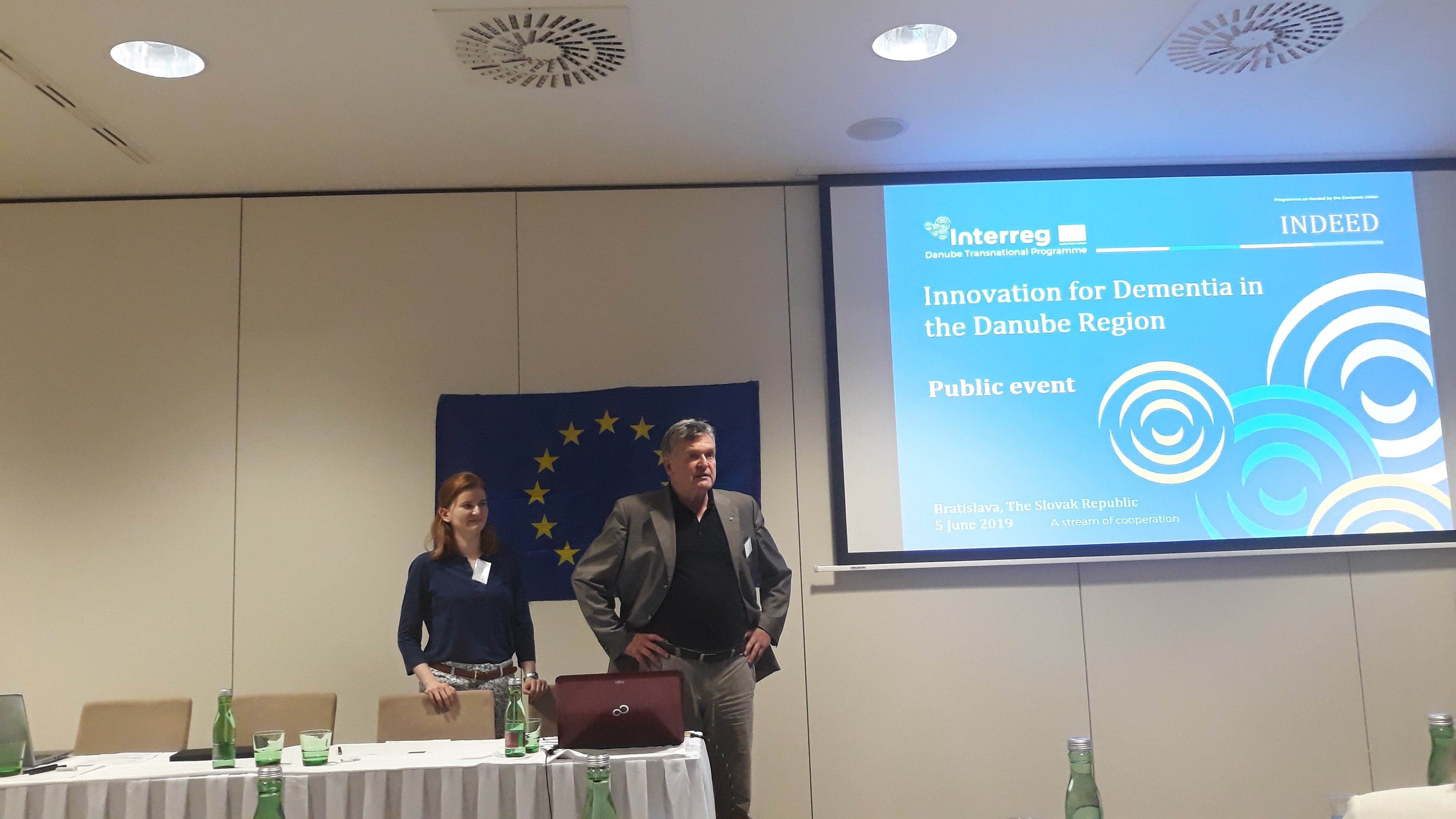
In his welcome presentation, INDEED Project Coordinator, Prof. Alexander Kurz (Germany) thanked all policy makers and project partners for participating in the second project meeting of INDEED. Prof. Alexander Kurz presented the INDEED project as follows:
- INDEED’s main objective is to improve dementia care in the Danube region and to contribute to the implementation of national dementia strategies;
- Three modules are currently being developed: CAMPUS (interprofessional educational programme), CONNECT (networking tool), and COACH (business advisory service);
- This intervention targets institutions involved in dementia care - examples are professional boards of GPs, neurologists, nurses, occupational therapists, physical therapists, psychologists, speech therapists, social workers, as well as nursing schools and entrepreneurs with an interest in the sector of dementia care.
Representatives from the policy level from ministries and municipal administrations are involved as multipliers to enhance user friendliness and sustainability of project outputs. The modules will be delivered in a blended learning format, consisting of workshops and a multimedia online platform. The modules and the blended learning format will be evaluated in 24 pilot actions, of which six will take place in Slovakia in 2020.
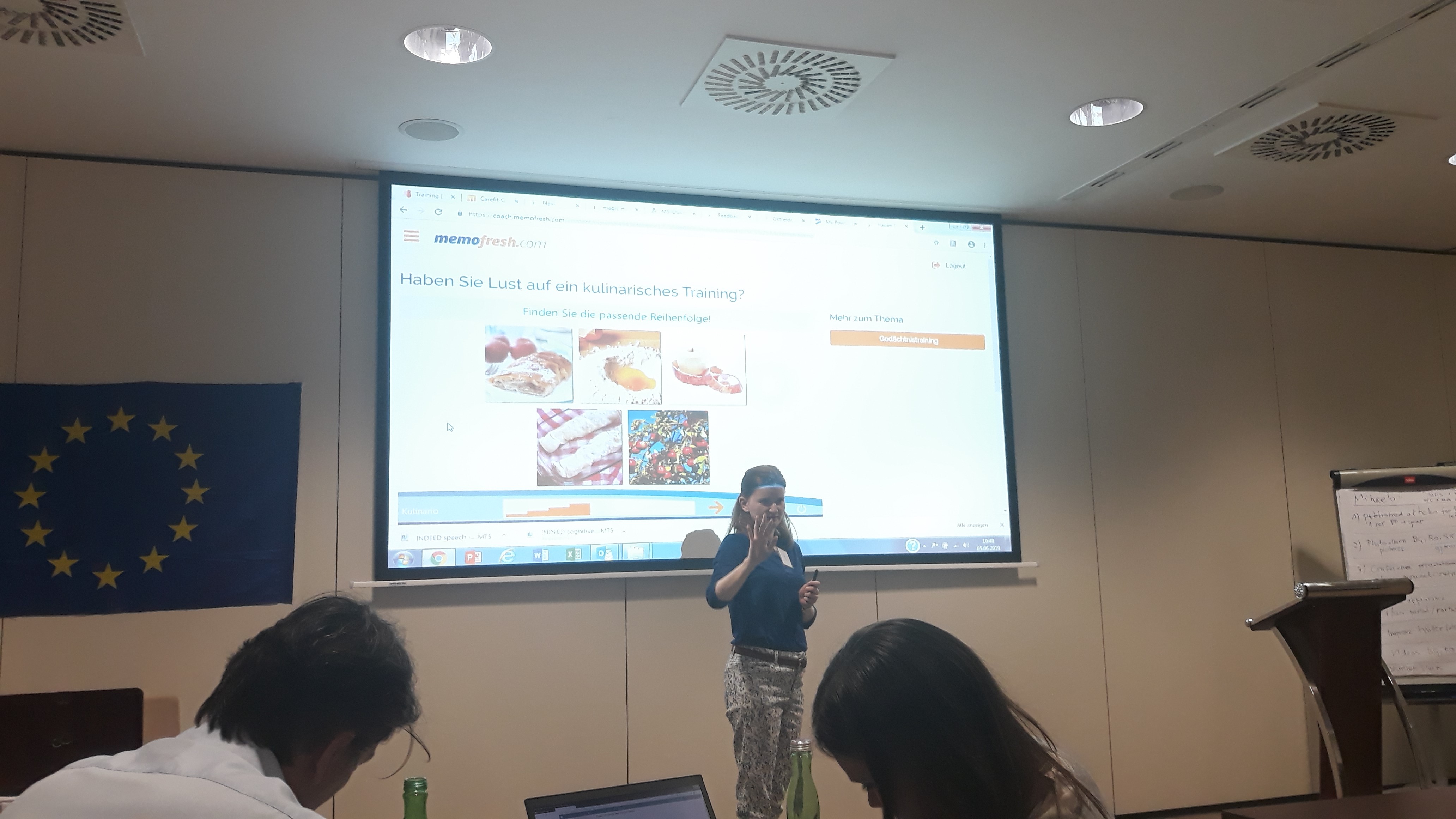 INDEED Project Manager, Lea Pfäffel (Germany) summarized that the project partners have formed a great team since the kick-off meeting in September 2018. Several workpackage-related meetings have been held in Austria and Bulgaria. Furthermore, INDEED has been presented to the public at various events and conferences in Austria, Bosnia-Herzegovina, Bulgaria, the Czech Republic, Hungary, Romania, Slovakia and Slovenia. In addition, INDEED extended its networking activities to countries outside the project area, mainly in Greece, Albania, Serbia and North Macedonia. The article about INDEED in Alzheimer Europe’s magazine “Dementia in Europe” was an important step which was followed by the publication of the INDEED flyer, policy brief and brochure.
INDEED Project Manager, Lea Pfäffel (Germany) summarized that the project partners have formed a great team since the kick-off meeting in September 2018. Several workpackage-related meetings have been held in Austria and Bulgaria. Furthermore, INDEED has been presented to the public at various events and conferences in Austria, Bosnia-Herzegovina, Bulgaria, the Czech Republic, Hungary, Romania, Slovakia and Slovenia. In addition, INDEED extended its networking activities to countries outside the project area, mainly in Greece, Albania, Serbia and North Macedonia. The article about INDEED in Alzheimer Europe’s magazine “Dementia in Europe” was an important step which was followed by the publication of the INDEED flyer, policy brief and brochure.
Benchmarking and Strategy (WP3) – final presentation of survey results
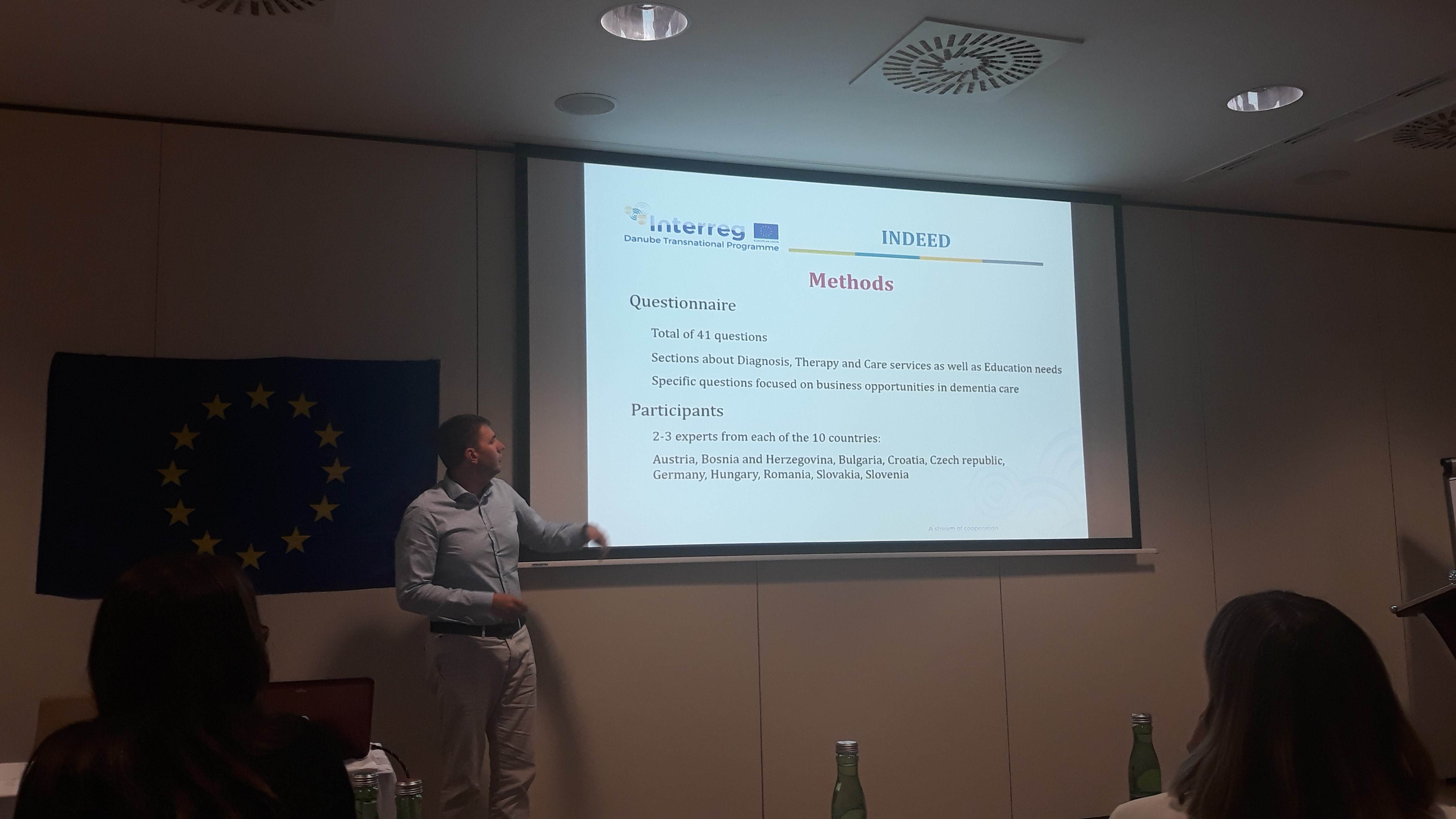
Work package 3 has successfully provided a basis for the subsequent work packages: The Strategy Statement, the review of national dementia plans, and the didactic and design concept are being further used within the other work packages. The final results of the “updated expert survey” were presented by Ivo Popivanov (Bulgaria): 41 questionnaires were completed by dementia experts from all 10 countries of the INDEED project area. Main results include:
- General practitioners (GPs) are the entry points for diagnostic services, and key figures in treatment and care;
- While GPs are spatially available in all countries, the role of GPs is particularly important in rural areas compared to metropolitan areas;
- Neurologists and psychiatrists perform the diagnosis in all countries, except for Germany where the diagnosis is made by the GPs;
- Pharmacological treatment is widely available in all countries;
- Dementia-specific services are lacking (e.g. day care, respite care);
- The concept of social entrepreneurship for services in dementia is underdeveloped in all countries;
- Limited public awareness of dementia, lack of human resources, lack of specific facilities and late detection of dementia were identified as the greatest challenges;
- Training for health and social professionals as well as entrepreneurs is needed;
- A mix of face-to-face workshops and e-learning is required;
Ivo Popivanov highlighted that the survey results includes novel data about dementia in the Danube Region, and the presentation can be used by all partners for dissemination purposes.
Communication (WP2) – one year of communication activities for INDEED

Mihaela Zamfir (Romania), INDEED Project Communication Manager emphasized the main achievements of the communication activities since project start:
- Set-up of a communication plan that details the goal of INDEED’s communication activities, target groups, key messages tailored to the respective target groups as well as media channels;
- Creation of the project slogan “Making dementia a health priority”;
- Publication of the factsheet “IT for institutional learning”;
- Provision of a media kit including various material such as photos, press releases, further material will be added over the course of the project;
- First project newsletter;
- Presentations about INDEED at various scientific events;
- Publication of the policy brief which includes specific project information for policy makers.
The current measures for social media are as follows (as of June 01, 2019):
- Facebook 288 likes
- Instagram 26 posts, 61 followers, 136 following
- Twitter 6 followers, 26 following
Mihaela Zamfir reported that all deliverables of WP2 for period 1 and period 2 were on time. Next steps include:
- Publication of the second project newsletter;
- Dissemination of communication material to target groups;
- Support of the pilot actions with “info days guide” (period 4);
- Development of a factsheet on educational governance (period 4);
In order to ensure a continuous communication with all target groups, Mihaela Zamfir encouraged all partners to collaborate in WP2 and provide information about news and events, photos, presentations, videos, and links to the WP2 team at SRA.
Content development (WP4) – current steps in CAMPUS and CONNECT
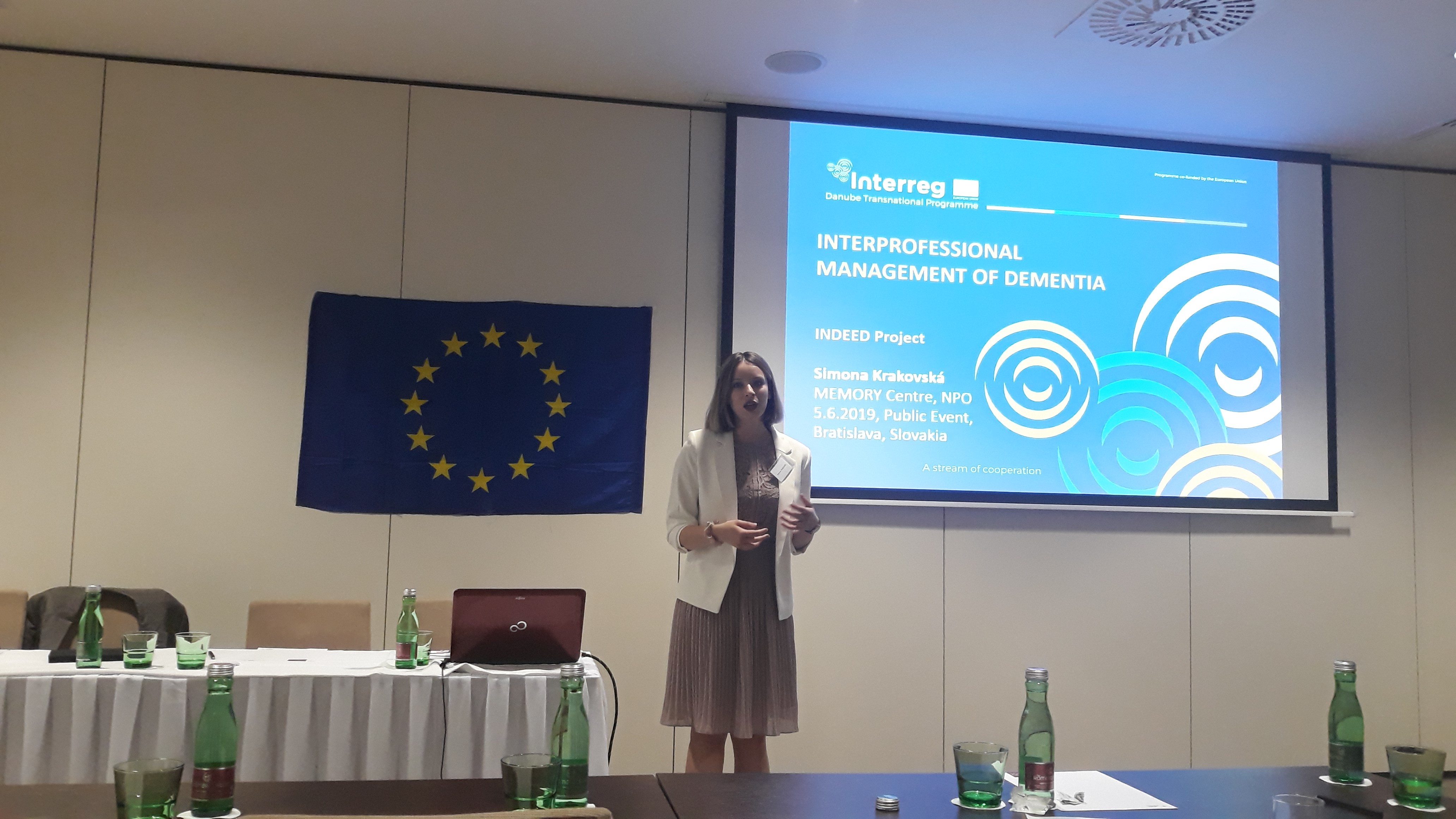 Simona Krakovská (Slovakia) described the process in WP4. In the focus groups, all countries of the project area were represented. In period 3, a script will be provided for the three modules. All PPs will be involved in creating the content, and the workload has been distributed. The modules CAMPUS and CONNECT will be organized in 3 chapters each, and 2 levels of information. Level 1 will provide information which all professions involved in dementia care should share, thus providing a basis for mutual understanding, collaboration and setting-up of individual treatment plans. Level 2 will feature more detailed information that is particularly important for specific user groups. CONNECT will address the cooperation among professionals and institutions. A contact list was preferred by focus group participants to a forum or chat room. A quiz will be created to simulate a case management approach. As the next step, MCB will provide the complete script of the first chapter of CAMPUS as a model for the rest of the materials. MCB will also collect feedback from the partners on the content and layout of the subchapters. In July, MCB will present an update of CAMPUS to the group.
Simona Krakovská (Slovakia) described the process in WP4. In the focus groups, all countries of the project area were represented. In period 3, a script will be provided for the three modules. All PPs will be involved in creating the content, and the workload has been distributed. The modules CAMPUS and CONNECT will be organized in 3 chapters each, and 2 levels of information. Level 1 will provide information which all professions involved in dementia care should share, thus providing a basis for mutual understanding, collaboration and setting-up of individual treatment plans. Level 2 will feature more detailed information that is particularly important for specific user groups. CONNECT will address the cooperation among professionals and institutions. A contact list was preferred by focus group participants to a forum or chat room. A quiz will be created to simulate a case management approach. As the next step, MCB will provide the complete script of the first chapter of CAMPUS as a model for the rest of the materials. MCB will also collect feedback from the partners on the content and layout of the subchapters. In July, MCB will present an update of CAMPUS to the group.
Content development (WP4) – current steps in COACH
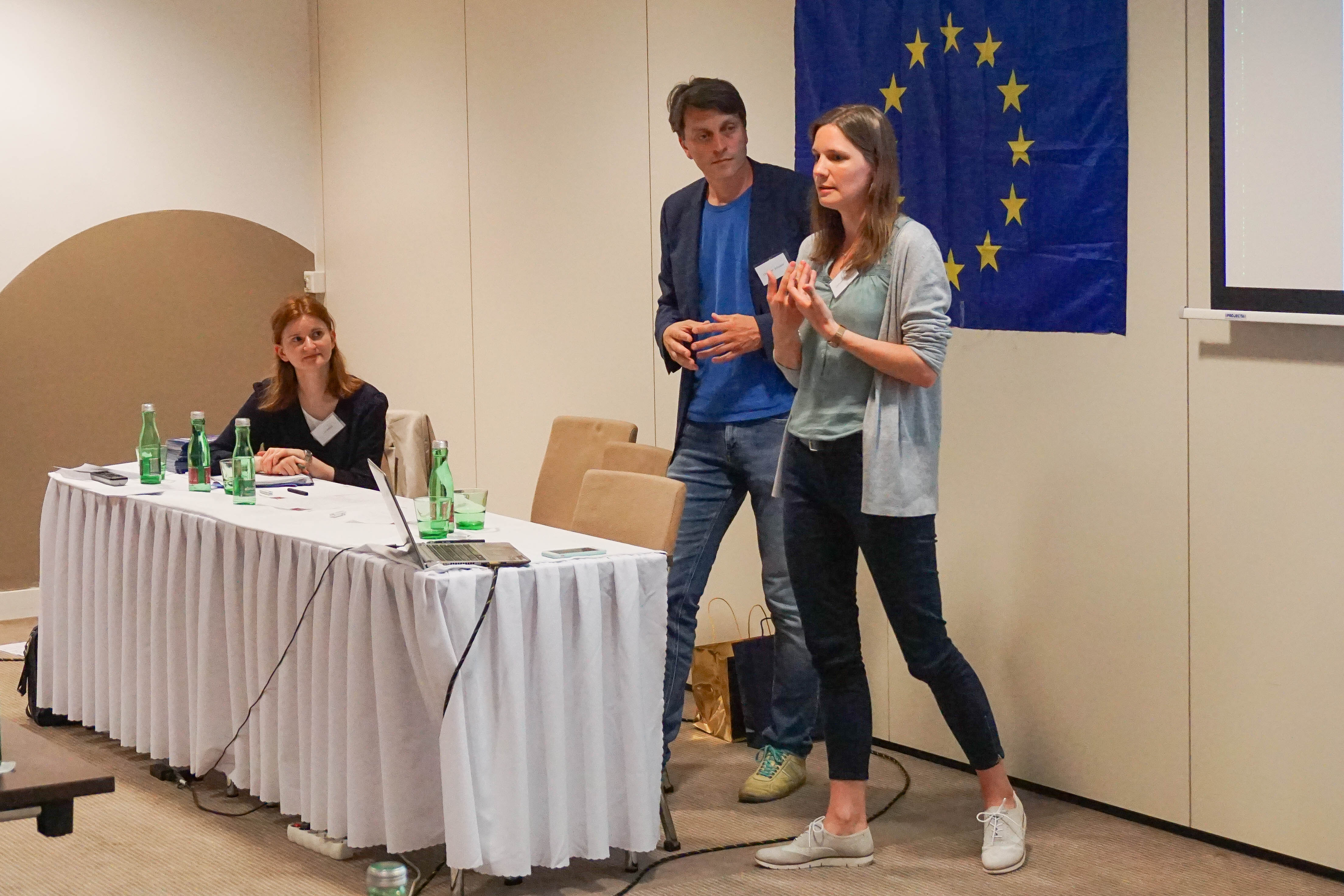 Christian Schober (Austria) emphasized that the COACH module will consist of two tracks: 1) business development track, and 2) good-practices track. Therefore, COACH refers to two different audiences 1) entrepreneurs with an interest in the sector of dementia care, and 2) dementia initiatives with an interest in enhancing their entrepreneurial skills.
Christian Schober (Austria) emphasized that the COACH module will consist of two tracks: 1) business development track, and 2) good-practices track. Therefore, COACH refers to two different audiences 1) entrepreneurs with an interest in the sector of dementia care, and 2) dementia initiatives with an interest in enhancing their entrepreneurial skills.
The business plan development track will include the following topics: Idea, Target group & Market, Service and Impact, Marketing, External & Internal partners, Costs, Finance, Implementation, Chances & Risks. These topics will be illustrated by selected case examples.
The good-practices track will showcase dementia-oriented services, their business idea and concept. The enterprises or projects featured here do not need to be run in a profit-oriented manner, but should be a good example for how to run a dementia service in an economically feasible way. Examples for good-practices have been reported from all 10 countries. The next step is to produce material about these good-practices and provide it to the team at WU for incorporating it to the online platform. The online platform will be a tool for the good-practice examples to advertise themselves and their service.
Policy (WP7) – first results from the policy scoping event
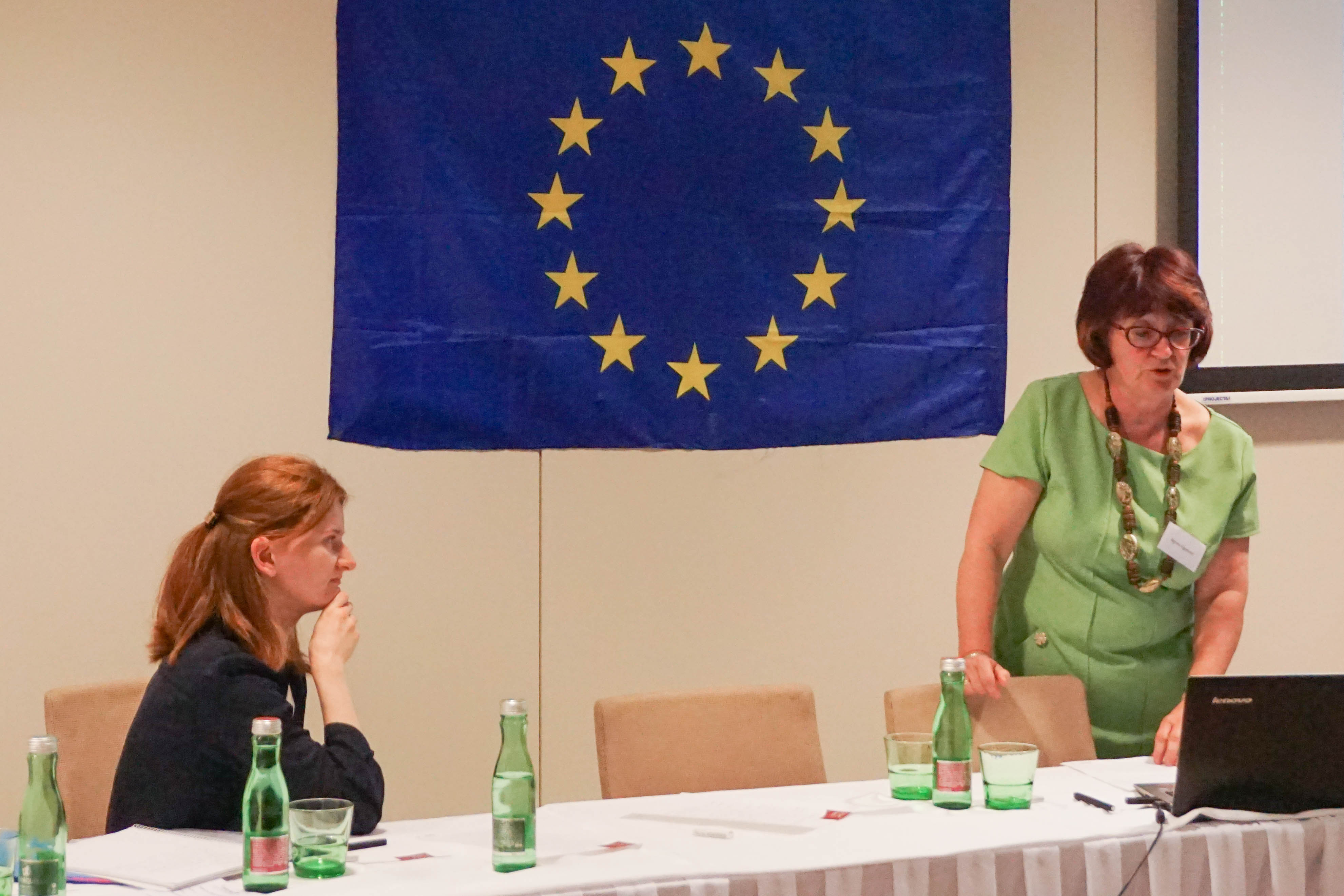
Agnes Egervari (Hungary) and the policy makers joined the consortium group in order to inform about the results of the policy scoping session. At the event, about 15 policy makers had been divided into three multinational groups. Key topics were: market involvement, cost-effectiveness, intersectoralism, and national dementia plans.
Wrap-up
To end the first day, all PPs noted their responsibilities, and next steps within WP2, WP4 and WP7.
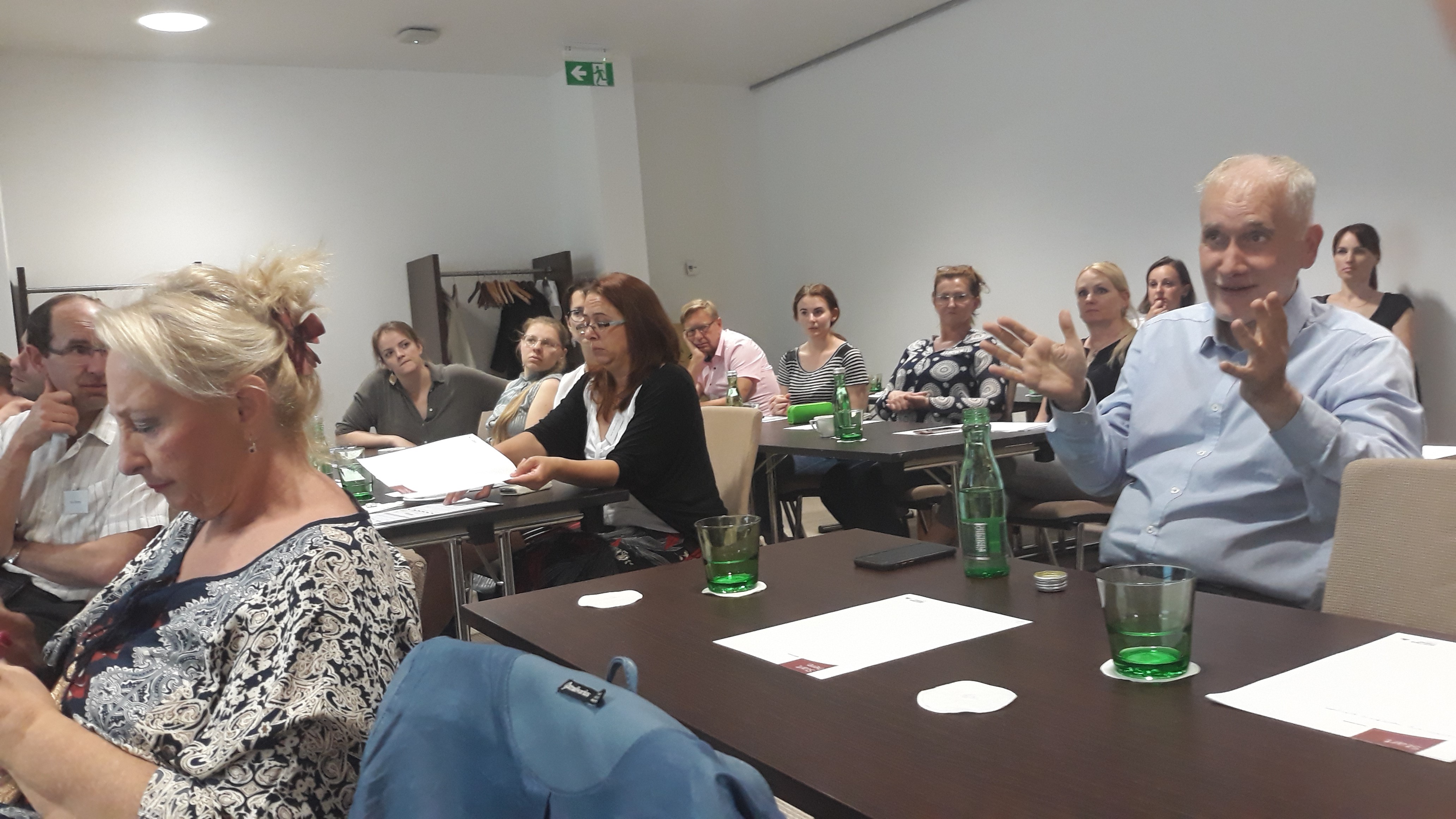
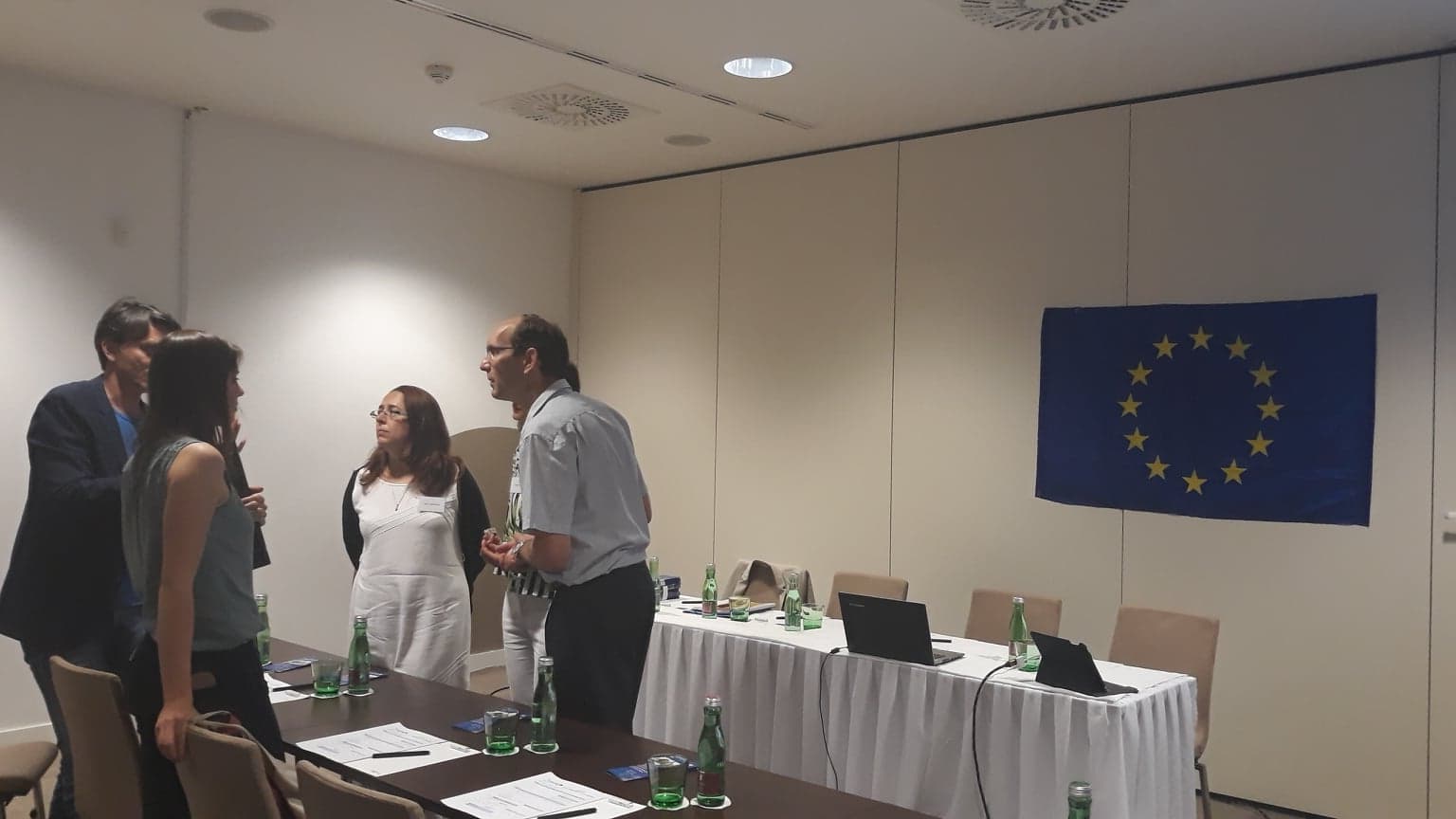
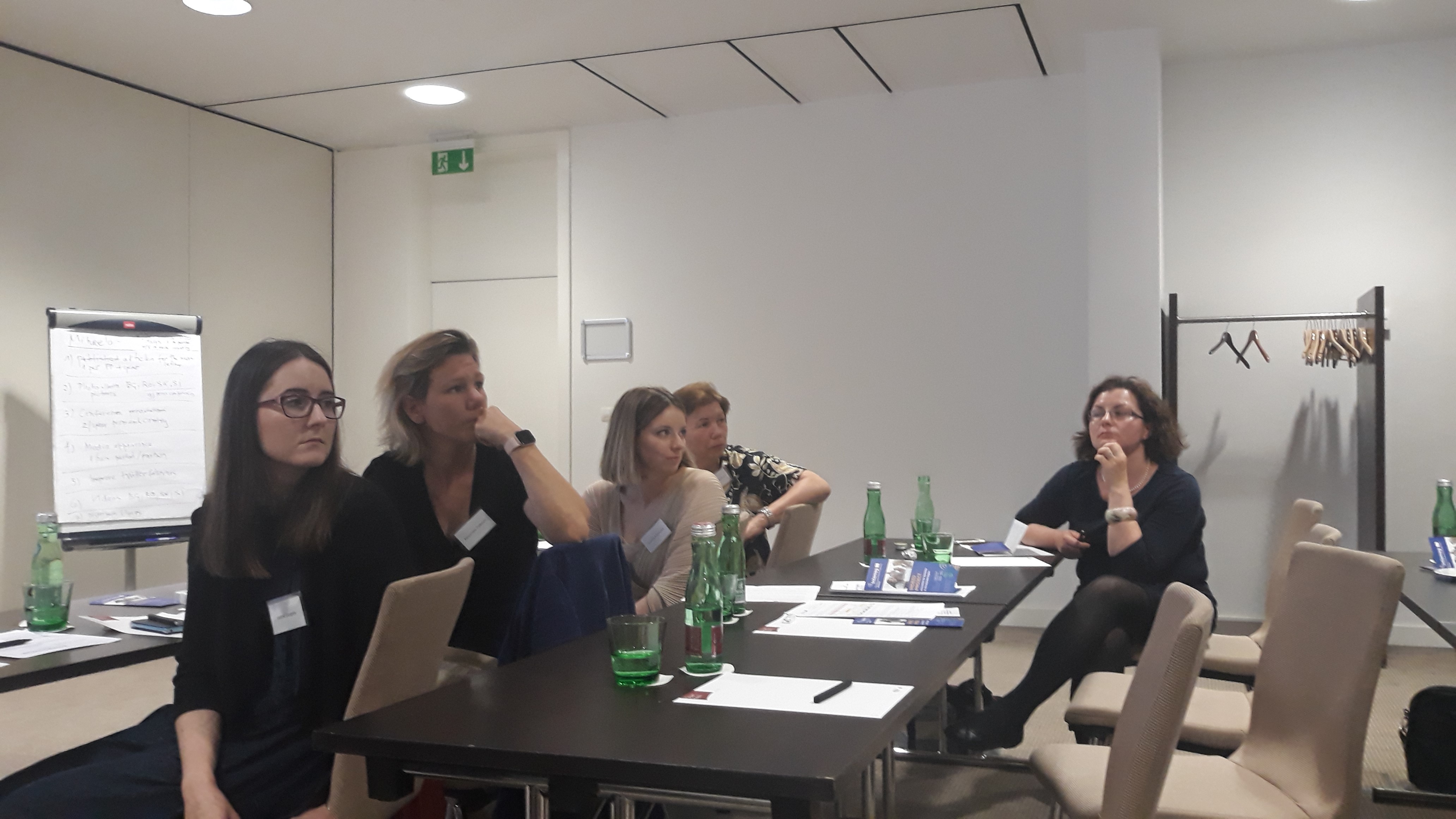
Management (WP1) – overview on project goals, workflow and budget
Lea Pfäffel (Germany) reported that the project implementation is ongoing as planned. Outputs and deliverables have been submitted timely in periods 1 and 2. Slight delays occurred, but solutions for compensating them have been sought after. All PPs have submitted their Partner Reports on time for periods 1 and 2. TUM-MED as the lead partner has created the Project Progress Report with the Application for Reimbursement for period 1. This report has been approved by the DTP and the respective ERDF/ IPA contribution has been transferred to the financing partners by TUM-MED. The Project Progress Report for period 2 with the Application for Reimbursement will be prepared by TUM-MED after the FLCs have certified the Partner Reports for period 2. TUM-MED will submit the Application for Reimbursement (period 2) until August 1, 2019. The overall spending forecast is reached.
Experience from the last months shows that work packages benefit from organising workpackage-specific conference calls in order to coordinate tasks. Lea emphasised that for the current reporting period 3 (May – October 2019), many deliverables and outputs are planned:
Since the subsequent work packages (finalisation of the online platform, organisation of the pilot actions) will rely on the outputs of period 3, delays should be avoided.
Next steps of W1 include:
- Organisation of First Year Review with JS in Budapest (July 08, 2019)
- Submission of Project Progress Report for period 2 (August 01, 2019)
- Assistance for creating Partner Reports of period 3 (October 31, 2019)
Multimedia Development (WP5) – overview on e-formats
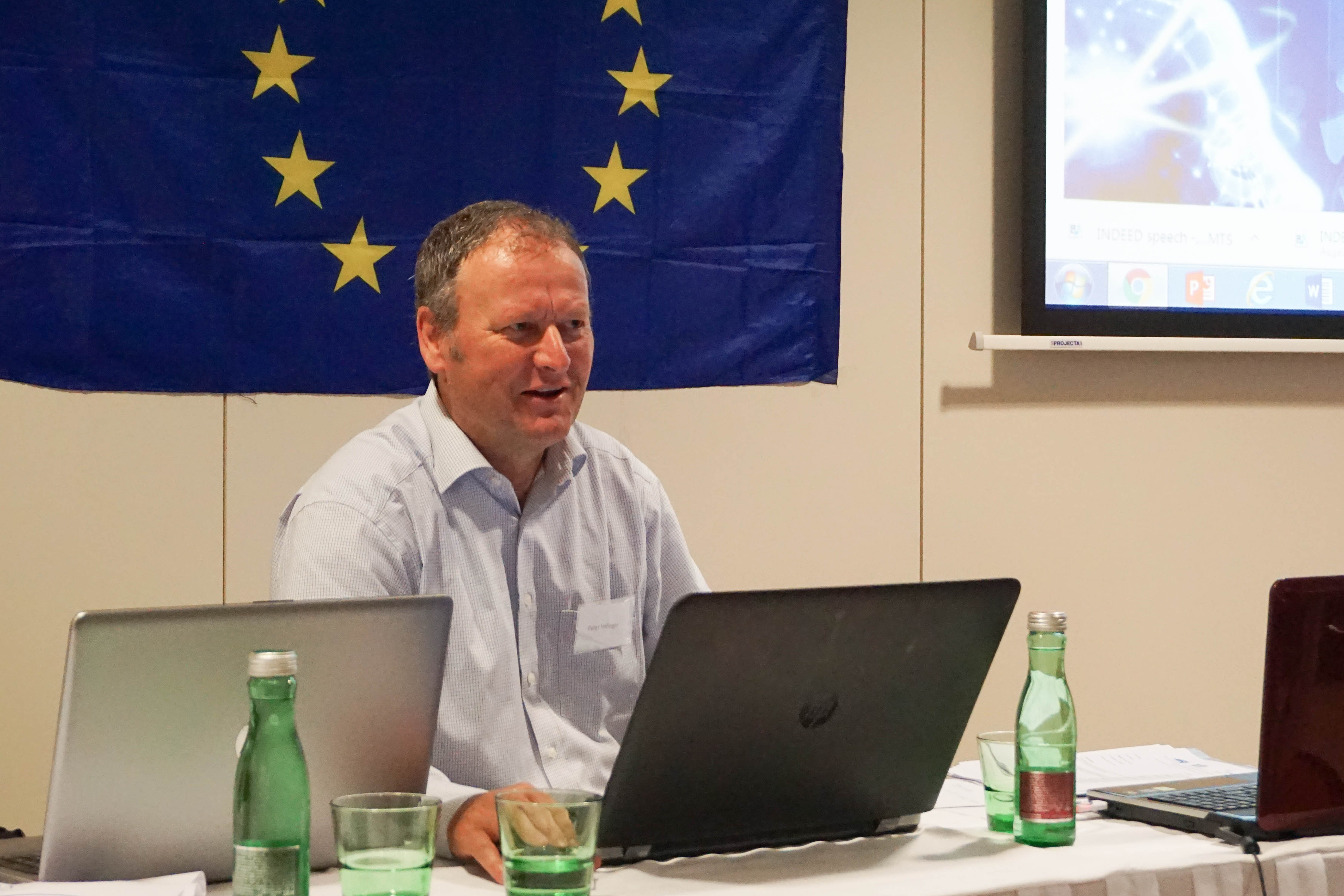 Peter Hofinger (Austria) explained that WP5 started in spring 2019 with a meeting of WP4 and WP5. Also, the following domain for the multimedia online platform was purchased after consulting the JS: “indeed-project.eu”
Peter Hofinger (Austria) explained that WP5 started in spring 2019 with a meeting of WP4 and WP5. Also, the following domain for the multimedia online platform was purchased after consulting the JS: “indeed-project.eu”
Participants lively discussed whether users should be asked to register with username and email address before receiving access to the full e-learning programme. Advantages of a mandatory registration are that evaluation of the programme would be more profound when tracking the trait of the individual users is possible. Furthermore, it would be necessary to track the performance of individuals on the platform when issuing CME points. Disadvantages of a mandatory registration are that users might not be willing to sign-up for a programme. A compromise would be to have an optional registration, but a consens has not been reached yet. Peter Hofinger will consult his team at TBC and evaluate how an optional registration can be implemented. A landing page giving information about the programme and featuring demo videos will be implemented in any case.
Overall, the following formats will be available on the multimedia platform:
- Animated videos via “powtoon” (https://www.powtoon.com/home/)
- Videos showing a real person / interview format
When recording videos that show a real person (not an animated drawing), the different lengths of the spoken languages (English, Slovakian, Slovenian, Romanian and Bulgarian) must be considered. Simona and Peter will test the procedure for the first chapter of CAMPUS.
- Infographics
- Texts, pictures and photos
- Quizzes After completion of a quiz, users will see a feedback page indicating their performance in the quiz. The questions and answers for a quiz need to be provided to TBC in an excel sheet (template will be provided by TBC).
For successfully growing the number of contacts in the database, users will be asked to enter their own contact details after the second chapter in CONNECT.
After implementing the first chapter of CAMPUS, WP4 will provide a detailed guideline for drafting the scripts. Regarding the recording of videos, a camera with microphone is available from the lead partner. Peter emphasised that recording videos with a current smartphone or tablet will be sufficient. Nevertheless, he asked all PPs to send a sample video to TBC in advance in order to check audio, format etc. Should it be necessary to record the audio track separately, Christian suggested to use the microphone of a smartphone headset for audio recording.
Pilot actions (WP6) – overview on workshop preparation
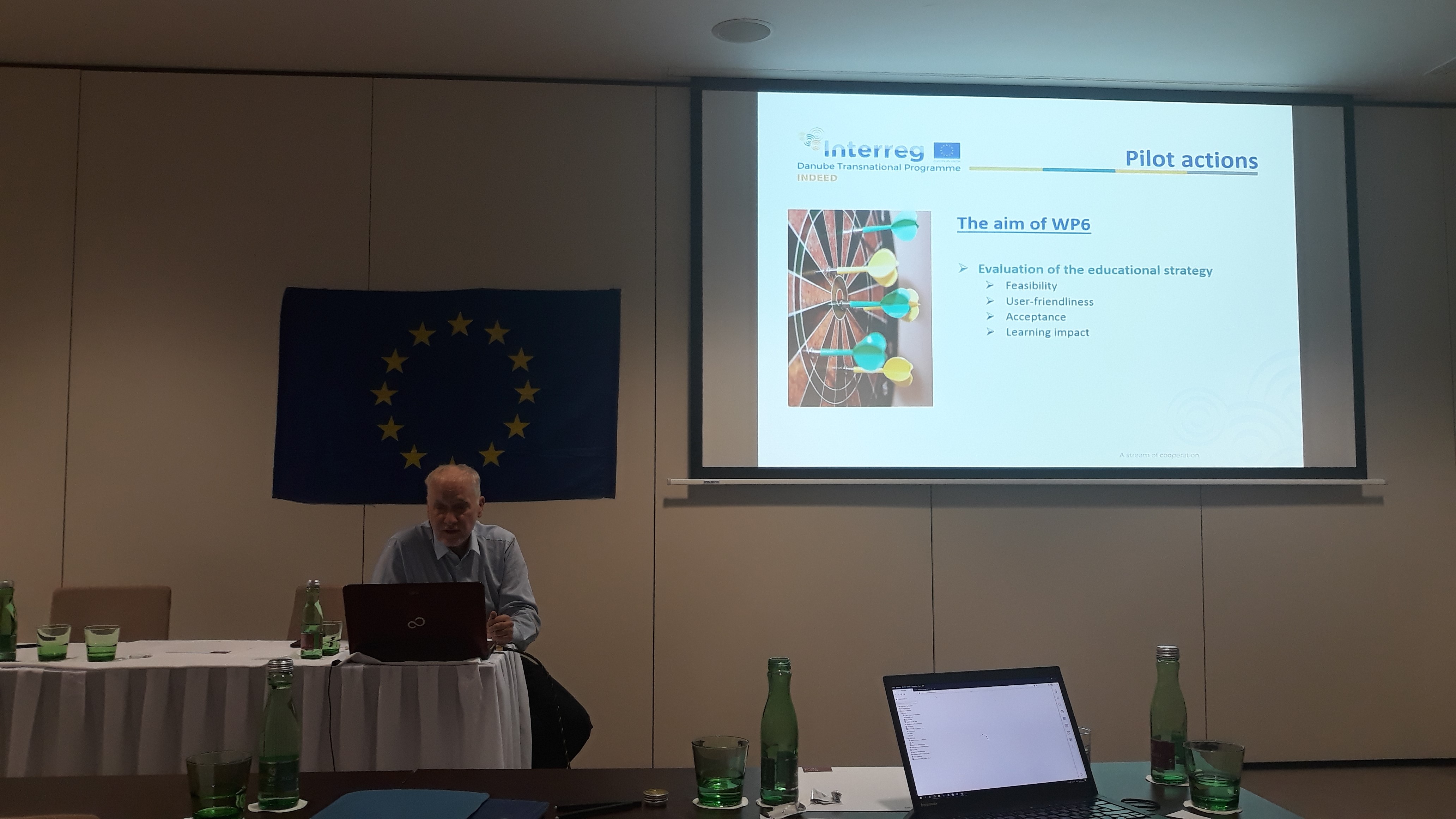 Zvezdan Pirtošek (Slovenia) presented the current outline of the pilot workshops as follows: In 2020, there will be 24 pilot actions in total – 3 two-day events each in Slovenia, Slovakia, Bulgaria and Romania. The workshops will take place in metropolitan, suburban and rural regions. The pilot actions will feature the blended-learning format:
Zvezdan Pirtošek (Slovenia) presented the current outline of the pilot workshops as follows: In 2020, there will be 24 pilot actions in total – 3 two-day events each in Slovenia, Slovakia, Bulgaria and Romania. The workshops will take place in metropolitan, suburban and rural regions. The pilot actions will feature the blended-learning format:
Day 1: CAMPUS & CONNECT with presentations and interactive parts as well as work with the multimedia platform
Day 2: COACH with presentations and interactive parts as well as work with the multimedia platform
The pilot actions will be co-moderated by UL and WU as well as a local dementia expert. The workshops will be bilingual. WU could provide a Romanian-speaking moderator with expertise in social entrepreneurship. Ivo and Shima will be the local hosts for the pilot actions in Bulgaria. Further local moderators are sought after. Since the pilot workshops are planned to be linked to a national or local dementia awareness event, WP5 is currently creating a list of such events to decide on the days of the pilot workshops. 25 participants are planned at each workshop; a list of possible invitees is currently being elaborated by WP5. Participants will be given a folder that includes all relevant information about the presentations and e-learning programme.
Wrap-up
Alexander Kurz (Germany) and Lea Pfäffel (Germany) thanked the participants for their valuable input. A special thanks goes to the team at MCB for organising the meeting.
These are the results of the first year of project summarized by General Assembly 2, we thank everyone for their support and we invite you to join us further to find even more interesting results.
